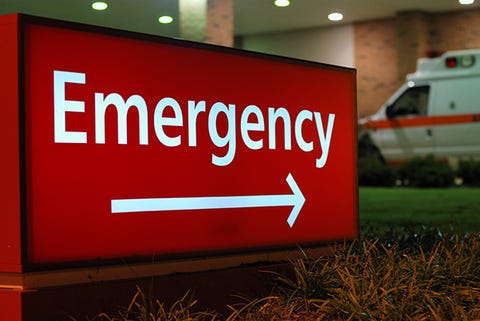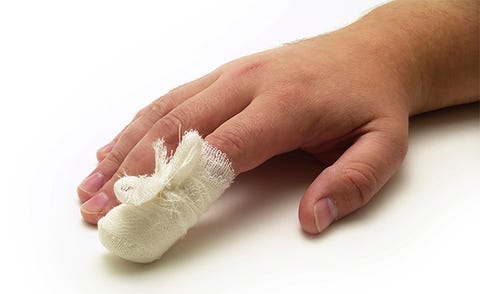You cut your hand; you've got a fever and don't know if it's the flu; you tripped and your elbow is feeling funky. Should you make a doctor's appointment? Head to the ER? Or go to urgent care?
Often the latter choice is the best one. "Urgent care centers are primarily used to treat patients who have an injury or illness that requires immediate care but isn't serious enough to warrant a visit to a hospital emergency room," says David Kim, MD, facility medical director of Memorial Care Medical Group in Long Beach, California. In other words: non life-threatening. But knowing whether urgent care is your best bet isn't always that black and white. To help you figure it out (and optimize your care once you're there), we rounded up 11 need-to-know secrets from urgent care workers.
1. You still need your doc.
Although urgent care can generally take care of anything a doctor's office can, "we don't replace your primary care physician," says Sean McNeeley, MD, medical director for University Hospitals Urgent Care in the Cleveland area. "Urgent care takes care of you when you're sick—having a regular doctor will ensure that someone is looking out for your health in the future," he says. It's your doctor's office that will watch out for signs of diabetes or track your blood pressure, watch your weight, make sure your immunizations are up to date, and discuss appropriate screenings, like mammograms.
2. They don't want to refill your prescriptions.
It seems easy—ask the doctor at the urgent care center for a refill on a diabetes or pain medication. It takes two seconds, right? Well, patients come in all the time with that request, and they're usually turned down. Chronic conditions are best monitored by primary care doctors because they're the ones who will see your treatment through and help you with lifestyle changes to control the condition. "If you don't have a primary care doc, you may be seen by one of our physicians or referred to a doctor to begin a long-term relationship that's so important for wellness," says Kim.
MORE: 12 Secrets Every Pharmacist Knows
3. Whenever possible, you should go mid-day
First thing in the morning and dinnertime are usually busier in urgent care, since patients come in before or right after work or school, says Kim. Later in the evening is another popular time, because doctor's offices are generally closed. He points out that Mondays and Fridays are historically the busiest days. You can't control when you get hurt or sick, but if you can, try to go in the late morning or early afternoon mid-week, when wait times are typically shorter.
4. There are some emergencies urgent care can't handle

sshepard/Getty Images
Urgent care centers will stabilize you, but hospitals have more resources and specialists at their disposal to treat these severe problems. Although the following list of 10 signs and symptoms that mean you should go to the ER isn't comprehensive, it's a good place to start, he says. So head straight to the ER if you have any of the following: chest pain, difficulty breathing, severe abdominal pain, severe bleeding or head trauma, poisoning or suspected overdose, seizure or loss of consciousness, sudden loss of vision or blurred vision, sudden weakness or tingling, severe headache, and confusion.
5. But you may be surprised by what they can treat.
Because most urgent care centers are outfitted with x-ray equipment, you can head there first for sprains and fractures, says Kim. They'll also provide IV fluids for dehydration as well as one-off routine annual physicals that you may need to quickly get for work or a sports team. (Remember, they'll just clear you for the imminent activity, not follow your health closely like a primary care doctor would.)
6. If you're bleeding, go to urgent care (most of the time).

ariusz/Getty Images
By all means, head to urgent care instead of waiting it out (possibly for hours) at the ER. "We can treat most lacerations," says McNeeley. The only times when it wouldn't be appropriate is when the cut is really deep, meaning you see bone, cut a tendon, or you think you could lose a limb. Still, if you show up at urgent care with a really serious cut, you won't be turned away. "We'll stabilize you and get you to the right place," McNeeley says.
MORE: 10 Secrets Every Doctor's Receptionist Knows
7. Don't bother calling ahead.
Sure, you could call and ask if your problem, like a mysterious rash or burn, requires an urgent care visit. But they'll probably tell you to come in anyway because they can't make a solid assessment of what's going on with you over the phone. That can be frustrating, but "it's difficult to tell you exactly what to do until we see your condition," says McNeeley.
8. You may be seen by a nurse practitioner.

Jetta Productions/Getty Images
And that's a very good thing. The fact that urgent care centers are staffed by nurse practitioners and physicians assistants who see and treat patients allows for greater access to healthcare for the public, meaning they'll be able to see you when your own doctor can't. Urgent care centers are overseen by board-certified physicians who are on duty at all times supervising the nurse practitioners and physicians assistants. Physicians will be called in to examine more serious conditions or symptoms (like chest pain), says McNeeley.
9. If there's any chance you could be having a heart attack, don't go to urgent care.
"When patients come into urgent care with chest pain and we either know for sure that it's a heart attack or think it might be, we immediately send them to the ER," says Kim. "You're wasting time by coming to urgent care, and when you waste time, you waste heart muscle and brain tissue," says McNeeley. Remember, in women, common heart attack symptoms can be sneakier, like shortness of breath or nausea and vomiting. A possible stroke (signs include sudden trouble seeing or sudden trouble walking) is another reason to head straight to the ER or call an ambulance. (Learn more about the common signs of stroke.)
10. Getting turned away is not as common as you think
It's rare for urgent care to turn patients away—research shows only 2 to 4% of patients have to go to an emergency room or another care provider, says McNeeley. Still, it happens. You'll be turned away if you have a suspected heart attack, have a very serious injury that the center isn't equipped to treat, or display any of the 10 symptoms mentioned above.
11. Yes, you should go in case of the flu.
"If you think you have the flu, you should see a doctor to determine if you need medication, or if rest, a bowl of chicken noodle soup, and time is all you need," says Kim. Whether that's your own doctor or an urgent care doctor mostly depends on the doctor's office availability and your own schedule. If your doctor can't see you right away, an urgent care center may be a better option. That's because if you have the flu (sudden onset of 100-102°F fever with muscle pains and severe fatigue) there's a 48-hour window to be seen to get medication that can help.
MORE: 6 Cold & Flu Old Wives' Tales, Debunked
Jessica Migala Jessica Migala is a health writer specializing in general wellness, fitness, nutrition, and skincare, with work published in Women's Health, Glamour, Health, Men's Health, and more.
This content is created and maintained by a third party, and imported onto this page to help users provide their email addresses. You may be able to find more information about this and similar content at piano.io
Posted by: cherilynae36531pritcherib.blogspot.com
Source: https://www.prevention.com/health/a20452568/when-to-use-urgent-care/
